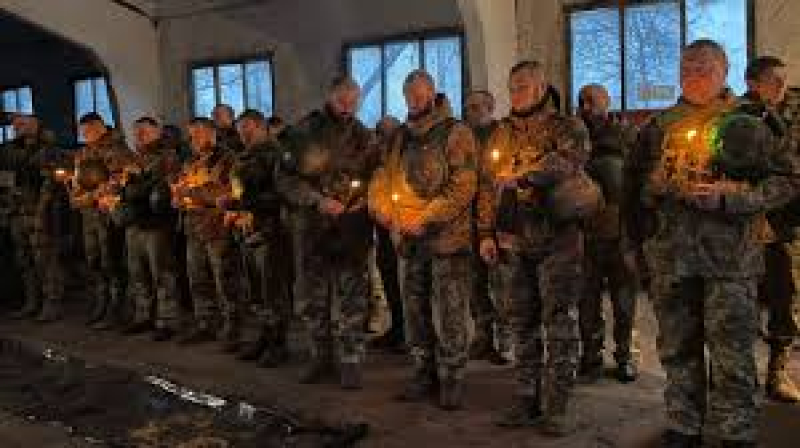- Hasina Gets 10 Years in Purbachal Plot Corruption Cases |
- NASA Finds Ammonia Compounds on Jupiter Moon Europa |
- Remittance Inflow Surges 45% to $3.17bn in January |
- Militant Attacks Kill 33 in Balochistan; 92 Assailants Dead |
- Power generation at Payra Thermal Power Plant 1st unit starts after a month |
The Ukrainian frontline city Russia could seize again

Christmas in Kupiansk is a celebration in name only. Most children have been evacuated and a fraction of its 26,000 population remains.
There is a visceral tension which comes with living close to the front line. Within the first hour of us arriving there were two sirens and incoming artillery fire.
This city was occupied for six months and then liberated last year.
However as western support started to wane, the Russians began pushing back.
"We all live on the edge, in fear of death," explains Svitlana. She works in a kiosk at the local market.
Svitlana
The strain feels most acute here. People are suspicious of our presence and start filming us with their phones. All as booms echo in the distance.
"When we go to work, we don't know what will happen," she says. "Whether Russia will hit with rockets, or whether we'll make it home alive."
As we moved away from the market, an ease in pressure was accompanied by a realization of how empty the streets were. Mostly the elderly stroll the pavements.
Through a wooden hatch we meet an exception, Sofia, a 17-year-old who has grown up with Russian aggression. Her father is fighting on the front and you soon grasp how this war has hardened her.
Sofia
"When the full-scale invasion began, we realised there were deaths everywhere," she says. "Understanding this makes you stronger and more resilient in stressful situations, even during shelling."
Sofia's family home in the nearby city of Izium was destroyed so they moved here. All of her friends were forced to leave Kupiansk long ago.
She outwardly fears very little, but is clearly unimpressed with her country's fate being determined by sceptical western politicians.
"I would invite them to see with their own eyes what it's like here," she says. "Then they would no longer question whether aid is needed or not."
Like Avdiivka, another eastern city, Ukrainian forces have been defending Kupiansk from a raised position as it sits on a hill. Across the Oskil River, which dissects it, you can see plumes of smoke as they struggle to contain Russian advances.
They're around 8km (5 miles) away, but there are fears they will push back to the eastern bank of the Oskil.
Ukraine's ambition of completely liberating its territory couldn't feel more distant here. Instead its troops are repelling wave after wave of Russian attacks.
With Russian drones constantly loitering above, large gatherings are dangerous. In a barn near Kupiansk, around 15 soldiers find the briefest of pauses for a Christmas prayer.
The candlelight illuminates the condensation from their breath. There's a thin layer of snow on the frozen soil outside.
After some coercion from an officer to speak freely to us, Oleksiy, a soldier from the 14th separate mechanised brigade, explains the constant defending they're having to sustain.
"It's day and night, there are no breaks, it's 24/7," he says.
While Oleksiy fights, senior US politicians are on their Christmas breaks after failing to agree a military support package for Kyiv worth almost £50bn.
"The Russians have more targets, so we need more shells," explains Oleksiy. "They throw a lot of men and machinery into battle, they don't pity anything."
Kyiv argues that Moscow won't stop at Kupiansk, should it fall once more. It still wants the whole of Ukraine.
What it really wants to do is sell the idea of a Ukrainian victory. Although with the winds of battle blowing the way they are in Kupiansk, that's become increasingly difficult, reports BBC.

